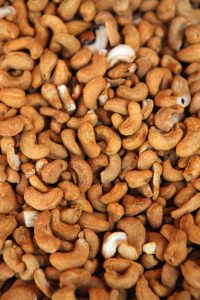
Kidney stones form when tiny debris in the urine reaches a high concentration and clogs the urinary tract. When the sand is more significant than 5 millimeters, it can be stuck and create pain. The urine cannot pass from the kidneys freely to the bladder. Often, most people do not feel that they have stones. This debris is small and flows away without causing any problems or pain. If we do not take care of ourselves, we do not take enough magnesium, and kidney stones show up. Why? Plenty of us are deficient in magnesium and are dehydrated.
How does it happen?
Individuals who have a history of hypertension, fast weight loss, deficient magnesium, or constant dehydration are prone to kidney stones.
Men suffer more from kidney stones compared with women. Of course, there is no joy because we do not need to suffer.

Kidney stones consist of calcium phosphate, uric acid, or calcium oxalate. Calcium phosphate and calcium oxalate are most common in the formation of rocks.
Individuals who have kidney stones consisting of uric acid usually have gout. It is a nasty condition when acid crystals pierce tissues and cause pain. If you read the book Captain Blood by Rafael Sabatini about pirates, you can imagine how it can be. It does not matter if you are the governor of Jamaica; you would search for help from the hated man. I talk about the book. By the way, did you read this book?
Kidney stones create pain if the size is more significant than 5 millimeters, for which people need medicine, such as painkillers or muscle relaxants. Surgeons remove large stones or use the method of lithotripsy.
Why do stones form?
Elevated calcium is the main reason for the birth and appearance of stones. Sufficient magnesium helps calcium dissolve and be removed with the urine flow. Unfortunately, plenty of us lack magnesium in our diets and, after it, suffer consequences.
Why does calcium cause kidney stones?
- Individuals who consume acidic foods such as meat, sugar, coffee, and alcohol are prone to have kidney stones. Acidic foods tend to pull the calcium from the bone to neutralize acidity. The calcium is excreted through the kidneys. The big diameter of debris creates problems such as pain and clogging of the urinary tract. There is no fun.
- Food full of oxalate can cause kidney stones, too. Chard, spinach, raw parsley, tea, chocolate(uh), tea, and rhubarb are oxalic-acid foods. Stones form when calcium binds to oxalate, creating calcium oxalate.
- The lack of liquids, especially water, can trigger kidney stones. The kidney’s function is to remove waste from the body. When we do not provide enough water to flush urine down to the bladder, we get the problem in kidney stones.
- People who drink plenty of soft drinks are at risk of getting kidney stones. Why? These drinks contain phosphoric acid, which tends to pull calcium from bones. I think that it is a crime. Why do bones suffer after these drinks?
- Meat, fish, and alcohol contain purines. If we consume too much of this food, we can enter the line to the doctor because of kidney stones.
What does magnesium have in common with the formation of kidney stones?
Magnesium has a strong relationship with calcium. You see that calcium is the main reason for the appearance of stones. Magnesium deficiency triggers calcium to deposit in the kidneys or urinary tract.
Besides it, phosphoric acid pulls magnesium from bones. If there is no sufficient magnesium, calcium forms debris and stones.
Magnesium helps dissolve calcium. This process is vital in all body parts, starting from cells and ending in tissues and organs.
Magnesium deficiency shows fibrositis, atherosclerosis, muscle spasms, stones, and breast tissue calcification. What is scary is that these calcifications need to be explored because you can think that you have cancer. There are mammograms, X-rays, and breast tissue biopsies involved. Who wants it? Not you and not me, thank you.
Too much calcium in the body and more minor magnesium cause problems. Why? Magnesium lets calcium dissolve and prevents it from forming crystals, debris, and stones.
According to Dr. Carolyn Dean, M.D., N.D.
If there is enough magnesium to properly dissolve calcium in the blood, then it won’t form crystals in the kidney.
Dr.Carolyn Dean
How to prevent kidney stone formation?

You need to drink plenty of water. Yes, I know that it is dull stuff. However, if you want to stay away from trouble, especially if you like processed food and sodas, you are forced to hydrate yourself; the amount of water must be half of your weight. For example, if you weigh 200 pounds, you need to drink 100 ounces of water. Adding 1/4 tsp of unrefined Celtic Sea Salt or Himalayan salt to one quart of drinking water will help you get some trace minerals.

A strict diet without junk food such as white sugar, white flour, fried foods, and trans fatty acids will help stay from the trouble of kidney stones.
Consume magnesium-rich foods such as kelp, wheat bran, brewer’s yeast, peanuts, cashews, almonds, brown rice, avocado, seafood, beans, dairy, etc.
Taking magnesium supplements such as ReMag, the best absorbable at the cellular level magnesium, ReMyte, the pico-ionic mineral formula, and ReAline, the B-vitamin complex, will help you stay in shape and feel well without kidney problems.
Wrapping up
According to Chinese medicine, kidneys are the source of vital life energy. Organs can be enriched and strengthened by a proper diet and regime. If you explore deeper, kidneys play a crucial role in the body’s metabolism. Without kidneys and their adequate job, the body would be clogged with toxins.
Westerners recognize the importance too, but we do not take proper care of ourselves. Poor diet and absent nutrients throw the body off balance.
Deficient magnesium cannot protect kidneys from the formation of stones. There is a simple way to avoid kidney stones. Sufficient magnesium and hydration will help keep the balance and protect from clogging up kidneys and urinary tract.
Leave a Reply